Potomac Wealth Advisors President and founder Mark Avallone details investors hope that artificial intelligence will add to companies bottom line.
Global energy demand is projected to surge in coming years amid the growth of artificial intelligence, which requires massive amounts of electricity.
The Wall Street Journal reported that big tech companies’ “obsession” with finding enough energy to power the AI boom was the talk of CERA Week by S&P Global last month.

The IAD71 Amazon Web Services data center in Ashburn, Virginia, US, on Wednesday, March 27, 2024. Amazon.com Inc. plans to spend almost $150 billion in the coming 15 years on data centers, giving the cloud-computing giant the firepower to handle an e (Getty Images)
America’s electric grid will need a major boost to power the rapid rise in data centers popping up across the country, and despite the push for renewables, there is growing skepticism that wind and solar energy sources will be able to keep up with the demand. Now, there is a renewed look at old-faithful: fossil fuels.
WE ARE APPROACHING THE DANGER ZONE AS IT RELATES TO OIL PRICES: MARK TEPPER
The Financial Times reported this week that producers believe the AI revolution will “usher in a golden era for natural gas,” with one executive telling the outlet, “Gas is the only cost-efficient energy generation capable of providing the type of 24/7 reliable power required by the big technology companies to power the AI boom.”

Natural gas production facility in Ballona Wetlands, Playa Del Rey, Los Angeles, California. (Citizen of the Planet/Universal Images Group via Getty Images / Getty Images)
But what if AI helps find more energy to power itself?
Phil Flynn, an energy market analyst and FOX Business contributor, says AI will substantially impact the U.S. oil and gas industry not only by increasing efficiency in finding oil, but by assisting in producing it in cleaner ways.
DEMOCRATS’ ‘RADICAL GREEN AGENDA’ IS A THREAT TO ALL AMERICAN FAMILIES: RUSSELL COLEMAN
“Artificial intelligence will take a lot of the guesswork away from mapping fields, and we should be able to pinpoint specific areas to drill where we can get the maximum amount of oil for the least amount of carbon emissions,” Flynn said.

A crude oil pump jack in the Permian Basin in Loving County, Texas, U.S., November 22, 2019. (REUTERS/Angus Mordant/File Photo / Reuters Photos)
He noted that there is even talk about using nuclear reactors to help power drilling operations, which would significantly reduce greenhouse gas emissions from the production of oil and natural gas.
GET FOX BUSINESS ON THE GO BY CLICKING HERE
“There are so many ways that AI can improve U.S. oil and gas efficiency,” Flynn reiterated. “Already, the US oil and gas industry has used extensive computer programs to map underground reservoirs, [which] artificial intelligence can improve upon. It could also improve, of course, on efficient ways to drill.”



